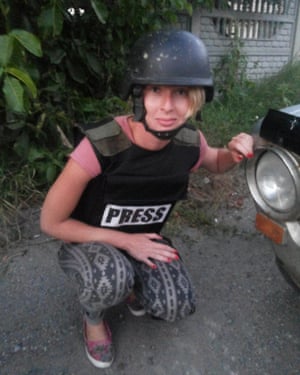
By Alisa Sopova, for The Guardian
When I started working as a journalist in my native city of Donetsk I never imagined that war would come to town, until the day it did.
In the spring of 2014 tanks and pro-Russia separatists showed up on the streets of the city, which was quickly turned into the capital of the self-proclaimed Donetsk People’s Republic (DPR).
I was a news editor at Donbass, the largest newspaper and website in the city and responsible for a dozen reporters covering local news. We reported on the governor’s weekly press conferences, the construction of a new hockey arena, several scandalous crimes a year – that was our journalistic routine. It felt like nothing unexpected could happen.
Then it did. Within days my neighbourhood had become a battlefield between the separatists and the national army and my newspaper was forced to suspend its activities, but this was an international news story so I was offered work as a fixer, then as a reporter for the New York Times.
My office dresses were replaced by a flak jacket and helmet. I saw people fighting, surviving – and dying. My colleagues and I often found ourselves under fire.

I quickly came to realise that the biggest challenge for journalists was not the physical danger, but the moral and emotional dilemmas posed by covering events in your homeland.
Should you write about corruption in the national army, knowing that your story will be distorted by the Russian propaganda machine and used against your country? How do you balance opinions about the conflict while your brother, a Ukrainian soldier, is imprisoned and tortured by the insurgents (a situation my colleague faced)?
These are the complicated but real choices that Ukrainian journalists still face. It’s easy to be a person of principle in a peaceful and democratic environment, but as soon as the situation gets personal journalists are told that “truth above neutrality” must prevail. However, that “truth” is never simple.
My house in Donetsk was shelled by government forces. They were retaliating because an hour earlier rebels, who were trying to use my family as a human shield, had shelled government forces from my backyard. Journalists in DPR mention only the first shelling. Ukrainian journalists mention only the second. Being neutral, you have to report on both. I did and never regretted it.
While staying in Donetsk, I was in constant fear of being arrested by the rebels for working with foreign media. While the threat of arrest was lower on the Ukrainian side, officials had a similar attitude towards journalistic neutrality.
In May 2016 the website Mirotvorets, which translates as Peacekeeper, the unofficial mouthpiece of Ukraine’s interior ministry, published a list of more than 4,000 journalists who had applied for accreditation to report from the DPR.
“We consider it necessary to publish this list because these journalists are cooperating with the militants of the terrorist organisation,” the website said. Among the “collaborators” were dozens of journalists from the Associated Press, Agence France-Presse, BBC, Reuters, al-Jazeera, and the New York Times.
While it’s difficult for international media to be branded as terrorist sympathisers, the real impact was on local journalists trying to cover the conflict on both sides.
Many of us had subsequent accreditation denied, and some were directly threatened about their coverage. Among the people hounding us were many of our former colleagues who had become soldiers of the disinformation war, putting “patriotism” above objectivity.
I am currently on a journalism fellowship in the US and believe the experience in Donetsk can provide some lessons for covering the Trump presidency. In times of fierce debate where journalism is under attack it is encouraging to see colleagues asking complex questions and constantly interrogating how the country became so polarised.
Journalists in the US have a responsibility beyond their nation. Thousands of my colleagues in post-Soviet countries, not to mention the developing world, look to them as a model.
It was an American newspaper that gave me the opportunity to objectively cover the conflict in Ukraine, and it is imperative that journalists in the US are able to maintain their instinct to come out of this crisis stronger, wiser and to continue to provide a blueprint for dealing with ethical dilemmas. The world still needs a good example.
By Alisa Sopova, for The Guardian
A version of this article originally appeared on Nieman Reports





